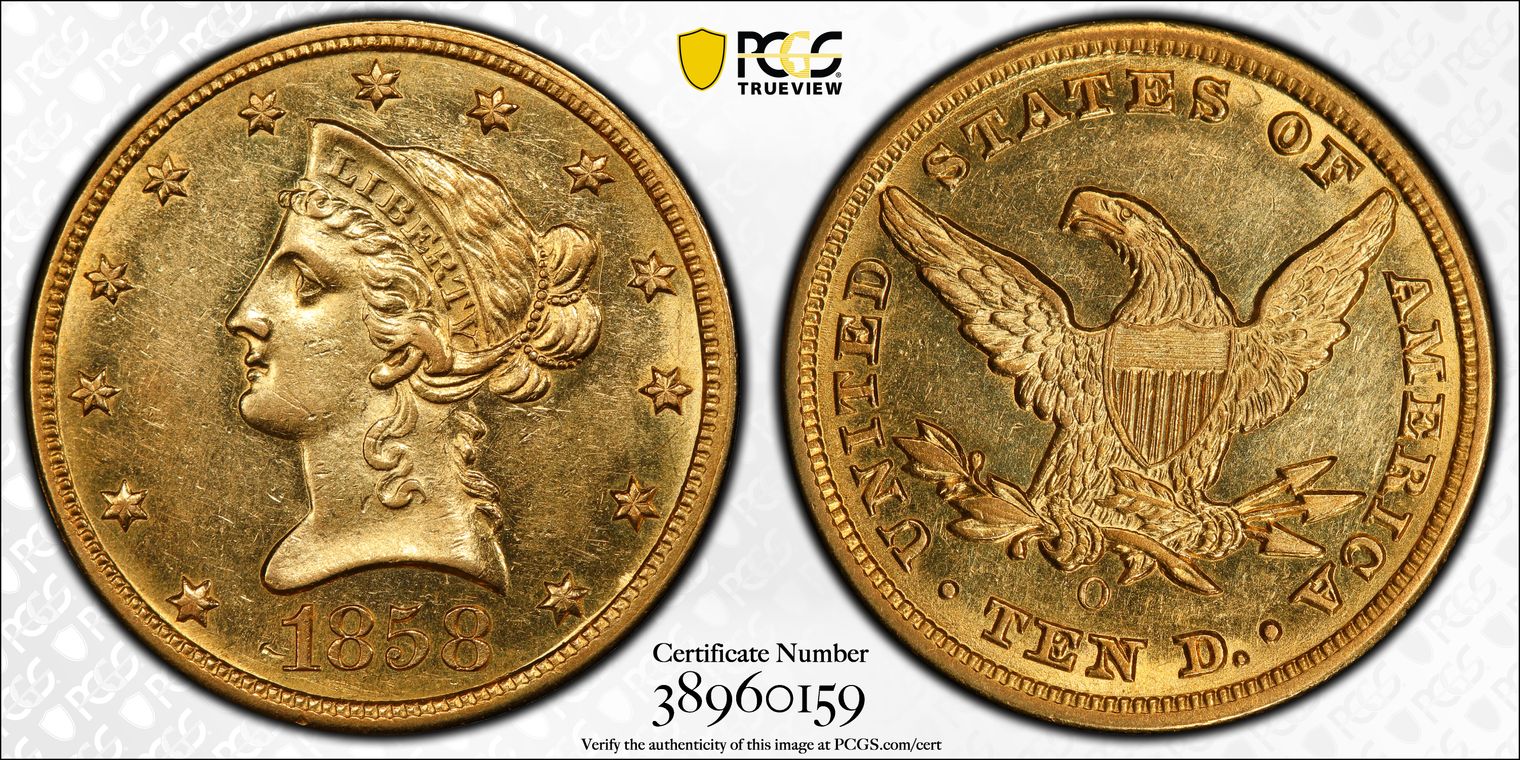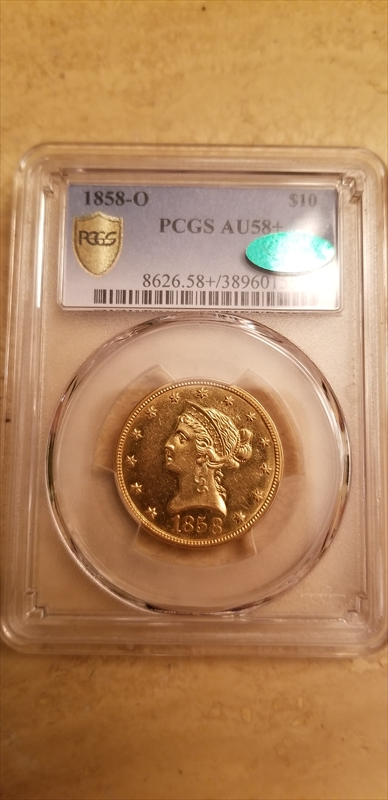1858-O $10 AU58+ 认证号38960159, PCGS号8626
拥有者评论
58+ cac pcgs. Anything graded higher than au 58+ are all in tight collection.
专家评论
David Akers (1975/88)
The 1858-O is a rare date in any condition, roughly comparable to the 1853-O. Most known specimens grade only VF or EF and AU examples are very rare. Uncirculated specimens are extremely rare but I have seen one piece that was a gem. Despite its rarity, the 1858-O is one of the five or six commonest O-Mint No Motto Eagles.Doug Winter
Due to the discovery of a few hoards, the 1858-O is one of the more available New Orleans eagles in higher grade. It is also less scarce in terms of its overall rarity than its comparatively low mintage of 20,000 would suggest.The 1858-O is among the more common No Motto eagles from the New Orleans mint. Unlike most dates of this type, the 1858-O is more often seen in EF and AU grades than in VF. It becomes scarce in AU55 to AU58 and is rare in Uncirculated, although it is more available in this range than any other No Motto New Orleans eagle except 1847-O.
In 1985, a large number of 19th century United States gold coins were found in Jackson, Tennessee during an excavation project. Many of the coins in this hoard were from the 1850s and a number of high quality New Orleans eagles from this era were included. It appears that the most plentiful New Orleans eagles from this hoard were the 1854-O Large Date and the 1858-O. Information remains sketchy but it appears that as many as two to three dozen comparatively high grade 1858-O eagles were found. The majority of the high grade 1858-O eagles grade MS60 to MS61 by today’s standards and a few were damaged while being dug out of the ground or abrasively cleaned afterwards. It is rumored that two or three very high quality pieces (i.e., MS63 or better) were found and then placed in collections.
STRIKE: This is one of the better struck No Motto New Orleans eagles. The obverse is found with good sharpness, with the exception of the stars, which are sometimes found with blunt centers. The date is sometimes weak at the base of the first 8 and the 5. The reverse is very well struck with full definition seen on the feathers.
SURFACES: The quality of the surfaces ranges from average to well below average. On pieces that are not from the hoard, there are typically scattered abrasions in the fields. A number of 1858-O eagles from the Jackson, Tennessee hoard are either heavily scratched or have deep marks from where they were carelessly excavated. Some are heavily hairlined from having been harshly cleaned after they were found. I have seen a few that had mint-made planchet flaws that ranged from small to major.
LUSTER: The luster is well above average. It is generally frosty and on some coins it is slightly reflective. More and more examples are being cleaned and dipped and as a result, examples with original luster are harder to find than in the past.
COLORATION: Higher grade 1858-O eagles are sometimes seen with a distinctive two-tone appearance on the obverse with a “band” of color circling the stars. Examples that are not from the hoard are usually light to medium green-gold while coins from the hoard often have rich orange-gold or coppery coloration.
EYE APPEAL: This is a date that can be found with relatively good eye appeal. There are some higher grade examples known, both hoard and non-hoard coins, that are well struck, lustrous and original. The date collector should be able to find a nice 1858-O eagle without a great deal of effort.
DIE CHARACTERISTICS: There are light areas of die rust below the left serif of the E and above the right edge of the B in LIBERTY. There is a small spur from the point of the final star towards the bust. There are many raised die lines within the vertical stripes of the shield.
MAJOR CHARACTERISTICS: There is just a single variety known, but there is a significant die state which has been mistakenly described as a separate variety:
Variety One: The date is quite large and well-centered with the 1 very slightly closer to the truncation of the neck than to the denticles. The second 8 is repunched in both the upper and lower loops. The mintmark is placed fairly high and close to the arrow feather. It is placed over the gap between the E and the N in TEN. The reverse was used again in 1859 and 1860.
Die State 1: The obverse has been lapped. The second 8 no longer shows repunching and it has a thinner appearance than before. The curls on the neck have been partially separated from the back of the neck.
PCGS #
8626
设计师
Christian Gobrecht
边缘
Reeded
直径
26.80 毫米
重量
16.70 克
铸币数量
20000
金属成分
90% Gold, 10% Copper
更高评级数量
13
评级较低的钱币数量
180
地区
The United States of America
价格指南
PCGS 数量报告
拍卖 - PCGS 评级的
拍卖 - NGC 评级的
稀有性和存量估计 了解更多
| 所有评级 | 237 |
| 60或以上 | 10 |
| 65或以上 | 0 |
| 所有评级 | R-6.7 |
| 60或以上 | R-9.5 |
| 65或以上 | R-10.1 |
| 所有评级 | 45 / 64 TIE |
| 60或以上 | 41 / 64 TIE |
| 65或以上 | 1 / 64 |
| 所有评级 | 78 / 183 TIE |
| 60或以上 | 65 / 183 TIE |
| 65或以上 | 1 / 183 |
状况普查 了解更多
| #1 MS63 PCGS grade |
| #2 MS62 PCGS grade |
| #2 MS62 PCGS grade |
| #2 MS62 PCGS grade |
| #2 MS62 estimated grade |





















